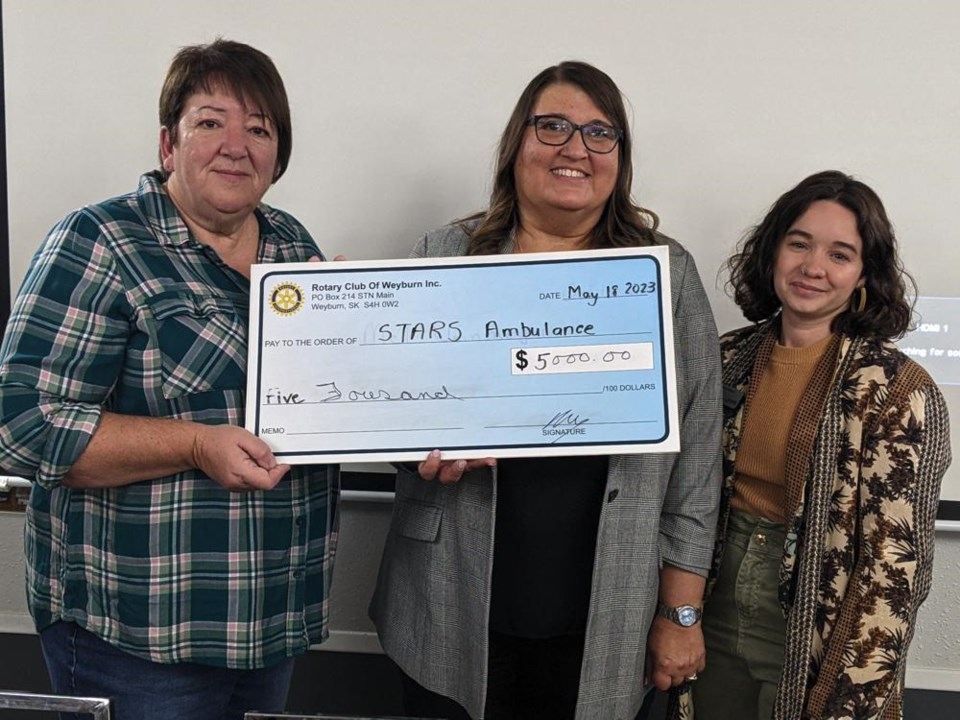WEYBURN – The Weyburn Rotary Club presented a donation of $5,000 to the STAR air ambulance on Thursday, the proceeds of the golf ball drop held last fall, and heard an update on how STARS has been upgrading equipment and serving the residents of the province.
The golf ball drop was held in conjunction with the Estevan Rotary Club in September, and the Weyburn club has confirmed the two clubs will be hosting the golf ball drop this year on Sept. 9 at the Weyburn Golf Course.
Kathy Skomar and Ashley Kilback, both community engagement officers for STARS, gave a presentation on how STARS is doing, and the recent upgrades they have been able to make.
“We’ve out here a lot,” noted Skomar, pointing out that STARS has flown to Weyburn 192 times since 2012, with 20 flights last year, and the same number in 2021, and 25 flights in 2020.
“STARS was founded on the conviction that no one should go without care that could save their life,” she said. “Fundamentally, we believe where you live, work and play shouldn’t impact your chances of survival. Medical technology is always evolving.”
She said in the last 10 years, STARS has flown 9,300 missions to 500 communities in Saskatchewan, and there are 26 fuel caches around the province to ensure the helicopters can be refueled when they go out a long distance.
Based across three provinces, the emergency dispatch centre for STARS is a 24-hour operations based in Calgary, which relays the calls to the closest base, and connects the crew with physicians on the ground for real-time consulting.
The helicopters have been upgraded to the H145 models, with three helicopters in Saskatchewan based in Regina and Saskatoon, and 10 across the three provinces. They can fly up to 250 km an hour, and can fly 600 km before they need refueling.
Onboard they have medical equipment, including an ultrasound machine, and carry four units of O-negative blood, which is swapped out every 72 hours to keep fresh.
The units even have the ability to take a blood test and have the results fairly quickly, which some hospitals can’t even do, said Skomar.
“We couldn’t do it without local first responders, such as ground EMS, fire and police, and our community partners,” she said, noting the personnel undergo continuous training to stay prepared for whatever might come up.
“It’s all about the patient. It doesn’t matter where you are or who you are. If you need critical care, we are there for you,” said Skomar.
For funding, she noted the provincial government provides half of the funds they need, around $10.5 million, and STARS needs to raise the other $10.5 million through fundraisers and corporate sponsors.
The STARS lottery is the biggest fundraiser, along with other events like the radiothon, the Field of STARS, and Rescue on the Prairies, where executives are flown out to a remote location, and they need to each raise $50,000 for STARS before they are rescued. Weyburn’s Dan Cugnet has taken part in the latter fundraiser event.
In addition, community partners have held numerous events to raise funds, such as suppers, barbecues, galas and golf tournaments, added Skomar.
The representatives noted that the STARS website has a number of videos that show what they do, and interviews some of the people they have rescued over the years, as well as one post that gives a viewer a 360-degree virtual tour of the interior of a helicopter.






